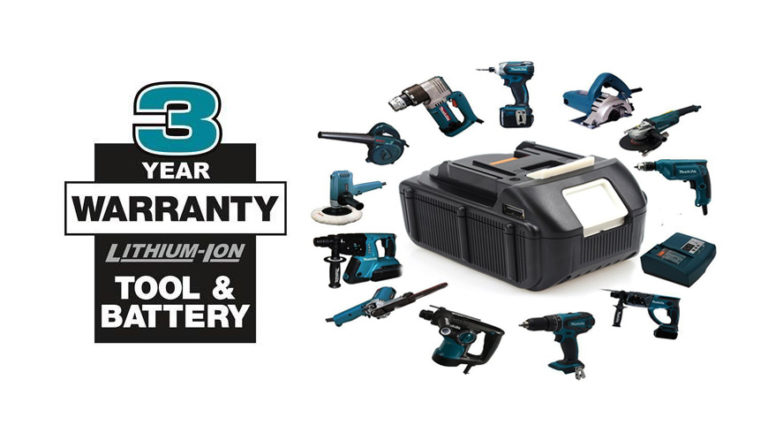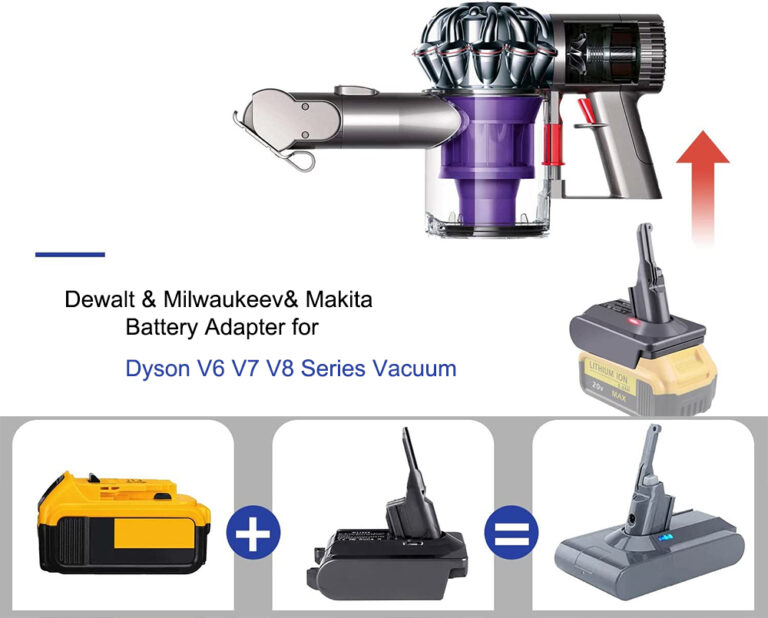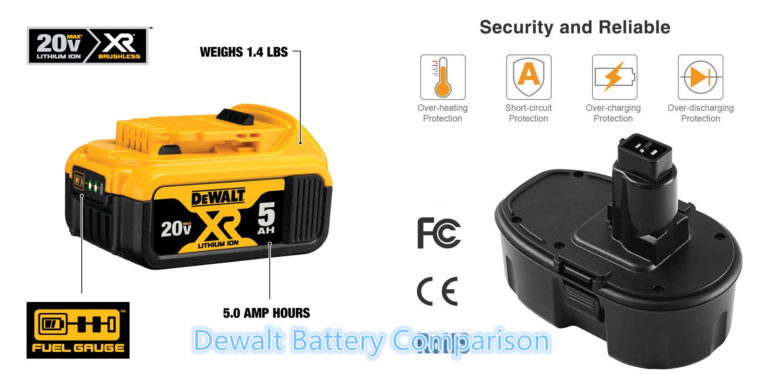If you are searching for batteries for your toughest tools, and want to know how to choose power tool batteries you have come to the right place. The cordless power tools used for specific purposes are ruling the tools industry nowadays. When buying power tools choosing the right Battery is a crucial point for the performance of your tools. There is various Power tool battery types available, NiCd vs. NiMH vs. Li-ion vs. Li-polymer. But do you wonder what are the things that decide the quality of the battery? Dig in to know everything about best power tool battery type.
What are the factors to consider when choosing the best battery for a power tool?

Voltage
Wonder what should be the suitable voltage for your tool? Voltage depends on the type of duty the power tool will do. For example, for light duty drilling tools, the voltage of 4v to 8 v is sufficient. For some high-performance screwdriver, you can opt for 7v to a 15v battery. The medium duty tools like hammers require a battery of 12 to 18v. The heavy-duty power tools like disc clutter, circular saws, and heavy drillers require a voltage in the range of 18 to 36. The best power tool battery type is the one with sufficient voltage for your device.
Capacity
Capacity is measured in ampere per hour and it indicates the how much energy battery can provide over a period of time. The larger the capacity the longer power tool will work. The capacity of 1.3 Ah is considered good for lightweight applications, while the recommended maximum capacity for a heavy tool is around 3.3. Ah. The good power tool battery should be able to provide the sufficient energy for the intended work and should be able to operate for, longer hours without getting discharged.
Function
When buying the power tool batteries for many applications, go through its specifications and function like the kind of technology it uses, the protection it provides etc. The good battery will have built-in protection circuit to guard against any malfunction. Take into account the efficiency and structure of BMS or battery management system.
Self-discharge
Under some high temperatures, a battery may not perform well. Because of internal chemical reactions, the battery may automatically use up the stored energy. So, self-discharge is the important factor to consider. Ideally, the good power tool battery should have low discharge rate. The metals like lead acid, nickel cadmium, nickel metal hydride are more prone to self-discharge than Lithium, alkaline, and zinc. So, consider the elements in the battery when making a purchase.
Weight
The lighter is the battery the more efficient it is to use and install. It should not happen that the battery is heavier because it has more power. In fact, high power density batteries are considered good when they are lighter. The nickel batteries are oldest power tool battery types and that is why they are not lighter. But with the advancement in battery technology lighter and yet more powerful batteries are available in the market.
Charge time
Charge time should be low for rechargeable batteries. For the batteries that require regular charging, it’s crucial that you choose a battery with low charging time. You can decide the charge time factor, by observing how fast your battery discharges. If battery discharge rapidly or has a high self-discharge rate then it will take more time to charge.
Cycle life
Number of charge/discharge cycles that a power tool battery supports is also an important factor to consider when determining the quality of the battery. Typically you will require recharging your battery when it falls under its capacity. The nickel-cadmium batteries support around 800 cycles whereas lithium batteries support a higher number of cycles. Also, you cannot recharge a nickel-cadmium battery before it gets full discharged, whereas lithium batteries can be charged when they are not fully discharged.
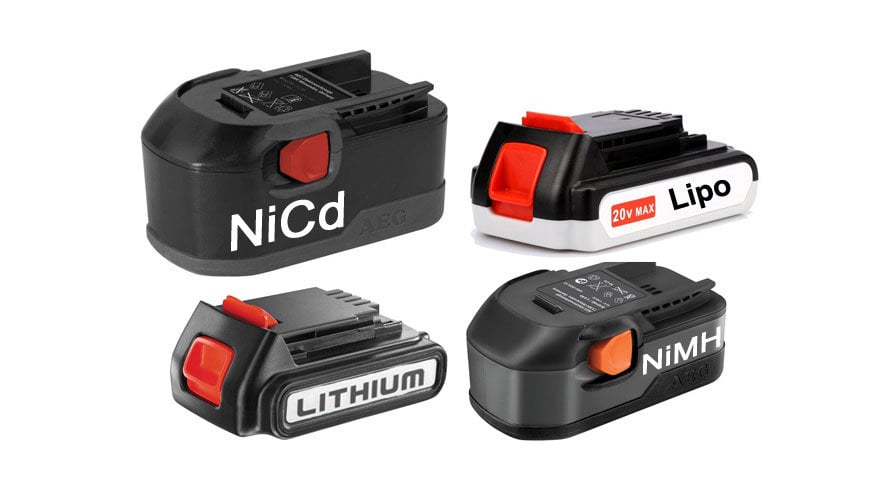
Power tool battery types
Whether you are using radio controlled devices, laptops, tablets, video console controlling devices, power banks for mobiles, notebook laptops or iPod you will need a power tool battery. It is not that power tool batteries support only such high power devices. They are also needed for devices like drilling machines, saws, and screwdrivers. You can use 4-5 v batteries for lighter drilling machines and 18 to 36 v batteries for heavier devices. Whatever be the purpose you need to do a careful decision regarding the battery type of your device. Ideally, a power tool battery should support your device, should fit easily, provide the minimum energy requirement, and withstand the high temperatures Now you know that what the power tool battery can do, let’s explore some of the best types of batteries for power tools.
NiCd

NiCds are the nickel-cadmium batteries commonly used in power tool batteries. They one of the best types of power tool batteries. Electrodes of NiCd contain nickel hydroxide and cadmium. In terms of cost, NiCd is the cheapest type of power tool batteries. NiCd batteries are dischargeable and can be charged effectively. NiCds batteries are commonly found batteries in power tools because they are very easy to maintain and they are durable. NiCds batteries are trusted batteries within users of power tools such as cordless drilling tools. Power tool devices can easily work with the NiCds batteries. When it comes to the protection it is difficult to damage the NiCd battery.
Most Importantly, NiCds batteries can be charged and discharged for 800 times. NiCds are one of oldest types of batteries that is why they are somewhat heavier than new batteries. NiCd batteries are easy for transportation and can withstand excessive loads. NiCds perform well even in low temperatures. However, NiCds need a complete discharge and need to be recharged periodically. NiCds are self-discharging and they show memory effect. Memory effect is the effect in which battery holds less charge. The memory effect can reduce the capacity of the rechargeable batteries if they are not discharged between the charge cycles. NiCd batteries have been extremely and widely used rechargeable batteries but being, the oldest technology in batteries they suffer from, memory effect. Also, cadmium in NiCds is a very toxic element and it needs to be discharged properly.
NiMH

Some limitations of NiCds were covered by a battery called Nickel-Metal Hydride. They are similar to NiCds only difference being the fact that NiMH uses hydrogen as an active element at the anode. Like NiCds NiMH batteries also have memory effect reducing its capacity. NiMH batteries offer 50 % more energy when compared to NiCds however; NiMH batteries don’t stand much in front of Lithium batteries. NiMH batteries are most environmentally friendly batteries available in the market. They offer same voltage as NiCds and are lighter than NiCds.
However, NiCd batteries cannot perform well in cold temperatures. NiMH batteries require frequent discharge and they also have a less charging cycle. Over the time, NiMH batteries have decreases popularity when compared to other battery types. NiMH batteries have lost their importance with the emergence of more advanced power tool battery types.
Lithium-ion

Li-ion is also called Lithium-ion battery. Lithium-ion batteries outperformed NiMH batteries for any reason. In lithium-ion batteries, lithium ions get transported from positive to the negative electrode and vice versa. The lithium-ion batteries are the popular and one of the most sought-after power tool batteries. Lithium-ion batteries are commonly used batteries found in laptops, cell phones, iPods and such other devices, Lithium-ion batteries have been popular because of a lot of reasons.
Firstly, they have high power density and energy density. When they are put in charge it is possible to take out them before the charging is done. The lithium batteries are considered the most advanced power tool battery type because of its high-performance metrics. Like NiCds, lithium-ion batteries also perform well under low temperatures and are eco-friendly as well. Being a reactive element lithium-ion batteries produce high power when compared to other batteries.
Lithium-ion batteries are lighter, more powerful and have a high capacity for driving big devices, and that is the reason behind ever-increasing preference to lithium-ion batteries.
Lithium-ion batteries come with the protection against excessive overcharging. These batteries require very less maintenance and can be easily used in devices.
However, Lithium batteries are very expensive. They can get excessively heated up if not used properly, they do not perform well under extra high temperatures. Lithium-ion batteries are considered ideal for people who want more power and fewer memory issues.
Li-polymer
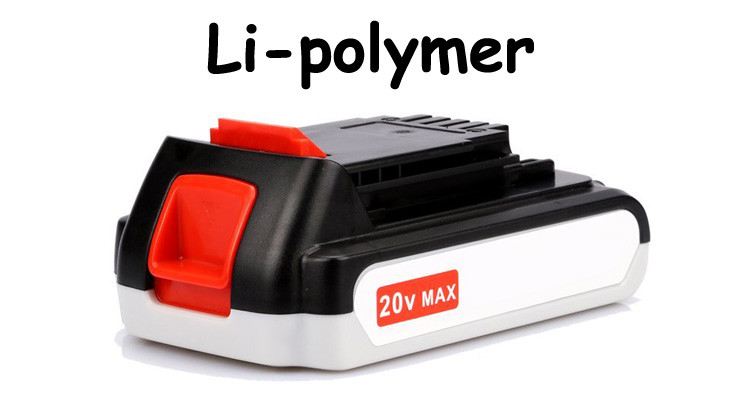
Lithium-ion battery with a polymer electrode rather than liquid one like in common Li-ion battery is known as Lithium-ion polymer battery used for power tools. These batteries are being widely used in radio controlled cars, aircrafts, and modern trains. These batteries are also popular batteries to use in mobile devices, iPods, tablets, laptops or notebook laptops, and power banks. Lithium-ion polymer batteries are reaching the heights of popularity because of its applications in various devices. They can be used for electronics, video controller devices and they will be used widely in electronic vehicles in coming days.
Lithium-ion polymer batteries are powerful than lithium-ion batteries. The reason behind the popularity of lithium-ion polymers battery is that they are the latest advancement in Power tool batteries and have the highest energy density when compared to its precedents. Lithium-ion polymer batteries are a modified form of lithium-ion batteries but with an energy density of twice that of the Lithium-ion batteries. It is predicted lithium-ion batteries will rule the power tools industry in coming years.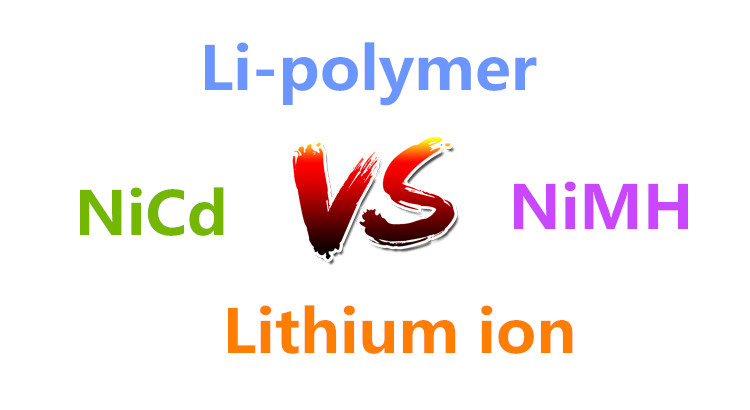
Which is the best? NiCd vs. NiMH vs. Li-ion vs. Li-polymer
Now you know that what the different types of power tool batteries are; You might be a bit confused about which battery to choose for your device application. Don’t worry; I am going to guide you now to help you choose the best type of power tool battery that will serve your purpose. Each type has their advantages as well as disadvantages, so let’s compare them. If you want battery for your tool that requires relatively low power or voltage and most importantly cost effective, go for NiCd batteries. They are common to use in smaller applications and are in fact the best drill battery type. But, be careful about their discharging issues. Now if you want the cheap battery but somewhat more energy density go for NiMH batteries. Both NiMH and NiCd are cost-effective, but NiMH is environmentally friendly and unlike NiCds they don’t contain toxic metals. Both are suitable to work under low temperature. But, the only reason that you may opt for NiMH over NiCd is that its capacity is approximately twice that of the NiCd.
As we have discussed earlier, both the NiMH and NiCd have one common issue; The Memory effect. This is the only effect that can trouble you, so if you are looking for a power tool battery that offers high energy, high power, and no memory issues then go for a lithium-ion battery. Lithium-ion batteries don’t have any memory issues and they offer much greater capacity than NiCd and NiMH. The lithium-ion batteries are lighter than NiCd and NiMH. Unlike NiCd, they don’t discharge very often or they have very minimal self-discharge characteristic and they do not need discharge before recharging them. They have the charge cycle of up to 1500 which is great when compared to NiCd which has around 800 charge cycles. So, if you want to cover the limitations of nickel batteries and if you are ready to spend some extra money for quality go for Lithium-Ion batteries.
Now, if you can afford to spend the extra money you can consider buying Lithium-ion polymer batteries. Lithium-ion batteries are in fact very expensive compared to lithium-ion batteries. But there are valid reasons for that. Lithium-ion batteries provide energy density that is almost twice that of the lithium-ion batteries. Lithium-ion polymer batteries are even lighter than Li-ion batteries and they can be made in any shape. Lithium-ion batteries will be the best choice for use in your laptop, iPod, tablets etc. You cannot opt for nickel batteries for use in such devices. So, lithium ion polymer battery will be your best fir if you want quality even though they are a bit of expensive.
| Types | Cell Voltage | Self-discharge | Memory | Cycles Times | Temperature | Weight |
| Nicd | 1.2V | 20%/month | Yes | Up to 800 | -20℃ To 60℃ | Heavy |
| Nimh | 1.2V | 30%/month | Yes | Up to 500 | -20℃ To 70℃ | Middle |
| Li-ion | 3.6V | 5-10%/month | No | 500-1000 | -40℃ To 70℃ | Light |
| Lipo | 3.7V | 5-10%/month | No | 500-1000 | -40℃ To 80℃ | Lightest |
NiCd vs. NiMH vs. Li-ion vs. Li-polymer comparison chart
Conclusion
I hope by reading through this guide you are pretty confident about your decision on best battery out of all the power tool battery types. Consider all the factors like, how much workload you are expecting for your tool, what will be its energy requirements, what will be the risk issues and finally your budget. But as a conclusion, it is worth spending money on quality power tool batteries. Hope this helps you.


